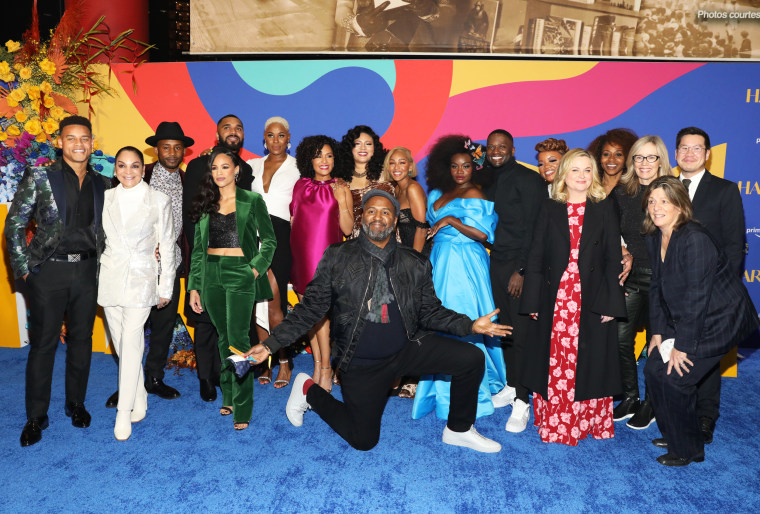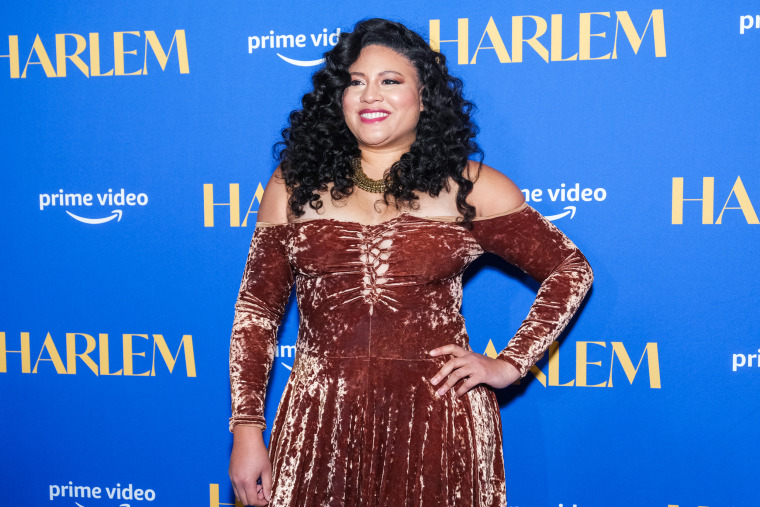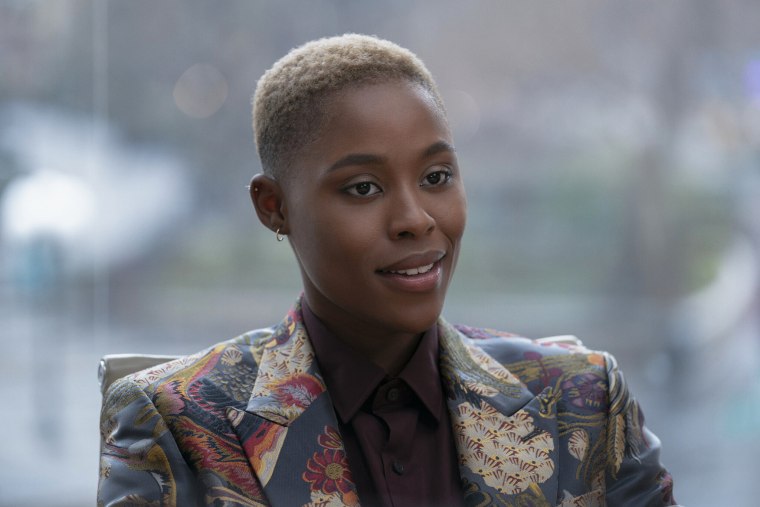After earning her master's degree in fine arts from the American Conservatory Theater in 2019, Jerrie Johnson decided to move from San Francisco to Los Angeles with one goal in mind: to book a series regular role on a major TV show within the next six months.
But after undergoing a four-month dry spell that left her feeling enervated and nearly drained her finances, she received two auditions that would ultimately turn her luck around in the City of Angels. The first was for a multi-episode arc on the hit Freeform drama “Good Trouble,” and the second was for a lead role in “Harlem,” a new comedy series that premieres Friday on Amazon Prime Video.
Created by Tracy Oliver (“Girls Trip,” “First Wives Club”), “Harlem” follows the lives of four stylish and ambitious best friends who met at New York University and who are now forced to navigate the trials and tribulations of their personal and professional lives while living in the mecca of Black culture in America. Johnson plays Tye, a successful, queer dating app creator who prefers keeping vulnerability at arm’s length, causing her to date women who might not always match up with her intellectually.
“I think there is something to be said about being a Black person/being a Black woman/being a Black queer woman in any male-dominated field — especially a white, male-dominated field — where you have to kind of shed away layers of yourself in order to get the job done,” Johnson told NBC News. “Women aren’t allowed to be emotional in male-dominated spaces, because then they’re ‘unstable.’ We see it in politics all the time.”
From the moment that she received the audition material for Tye, Johnson understood her character’s desire to carve out a place for herself in the tech industry, to the point where she has neglected other parts of her life.
“Throughout the series, things start to happen to her where she has to address it. She can no longer ignore that vulnerability and sensitivity that she needs to embrace in order to really hone in on the fullness of herself,” she said. “Throughout the season, we start to see these little tidbits of her health issues, and in episode eight, it just collapses on her, and she has to address those things, because she’s literally lying in a hospital bed and can’t get up,”
“Usually, in life, when people are very headstrong about something and they’re ignoring other things, it comes out in health,” Johnson added. “Our health will always reflect what we’re not addressing.”

Following the success of “Insecure” and “Run the World,” “Harlem” is part of a new wave of shows that delve into the complexities of Black women. The four lead characters — a tech entrepreneur, an anthropology professor, an aspiring fashion designer with a trust fund, and a vivacious singer and actress — are unabashedly ambitious, openly sexual and willing to admit that they don’t have their lives all figured out in their early 30s. It’s one of the many things that appealed to Johnson and her co-stars about this project, making for a fruitful collaboration on both sides of the camera.
“For Tye, I had a lot of those conversations with the costume designer, Deidra [Elizabeth Govan], who is amazing, who didn’t want Tye to be any stereotypical butch lesbian that you see, because we want to push the conversation forward,” Johnson explained. “Not only do we want to show real reflections of nuanced Black women, but also to elevate the conversation. There is no such thing as a Black queer woman who owns a tech company in America right now, so that is a new thing that we’re seeing,” she said about the show.
As a Black queer woman, Johnson said, she has always seen the world through a variety of lenses and intimately knows what it feels like to not be seen and represented in mainstream entertainment.
“And because of that, I yearn for reflections of that on screen, where someone is living truthfully and authentically in who they are but also has this heightened awareness of where they come from and what they’re navigating,” she said. “I just feel like my 11-year-old self didn’t have a lot of that, especially being from North Philly, where there’s not a lot of representation there, there’s not a lot of access there, and sometimes there’s not a lot of resources.”
The flip side, however, means it “forces people to be so creative,” Johnson said.
“I’m always speaking to those people who are from where I’m from, who want to see people like them, who want to hear people who sound like them, and that is so, so, so important to me — just so we can expand people’s visions of what’s possible,” she added. “Tye is expanding people’s visions of what is possible for a Black queer woman, and that’s the kind of characters that I want to play.”

Maintaining that high level of authentic representation didn’t only stop with Tye’s aspirational professional pursuits, but it also extended to her rocky personal life, as she navigates the queer dating scene in the Big Apple. Given that the show began production in early 2020, Johnson filmed multiple sex scenes before the Covid-19 pandemic and worked closely with intimacy coordinators who “were always asking questions” to make sure she was comfortable.
“I always felt a part of the process; I never felt like somebody’s making me do something or I don’t have a voice in what’s happening,” she said. “But what was important to me is also seeing an authentic representation of queer intimacy that’s not for the male gaze. We’re not trying to be sexy, we’re not trying to be cute, we’re trying to be real, and I was constantly having those conversations with the intimacy coordinator as well.”
Johnson said those conversations included asking, “How can we make this an authentic experience? How can we show queer women intimacy outside of the realms of what we’ve seen before?”
While “Harlem” chronicles the evolution of four unique women across different industries, the show is anchored by the dynamic of the main ensemble, highlighting the power and importance of Black female friendships. In what she can best describe as “love at first sight,” Johnson said she felt an instant kinship with her three co-leads — Meagan Good, Grace Byers and Shoniqua Shandai — because “these women feel like people I know in my life. They’re authentic women, and they have a sense of themselves.”
And while “ego and a little bit of insecurity can get in the way” in a competitive business that is used to pitting Black women against one another for a limited number of coveted roles, Johnson “never felt that with any of these women,” no matter how long their resumes were.
“It was always camaraderie, it was always friendship, and we always presented a united front. If something happens on set that we need to discuss, we all are going to say, ‘OK, we were thinking about this, and how can we shift, because maybe this isn’t working,’” she said.
Johnson noted that “Harlem” is her first experience as a television series regular.
“It was beautiful but also a little unfortunate to me that some of my castmates were like, ‘Jerrie, this isn’t how it is everywhere.’ We were having such a good time, and there was so much support, but I think we need to normalize this experience,” she continued. “We need to normalize the experience where Black women can work on a show together, have a good time, and truly and genuinely love each other.”
Throughout the process of shooting the 10-episode first season, the four women worked closely with Oliver, who serves as the creator and showrunner, as well as the other writers and producers to ensure that certain lines were not “inauthentic to us as people or triggering to Black women,” Johnson said.
“As a Black woman, watching Black women on TV — especially when the people behind the scenes aren’t Black women — can be a little triggering or jarring, because it feels like this isn’t a true reflection of my life or the life of many Black women that I know, and I can tell by just how one-dimensional this is that it wasn’t a Black woman who wrote this,” she added. “I think this will be a very liberating experience, and I’m so glad that it’s happening in Harlem, which is where I live now, because Harlem is so vibrant. It’s just thriving with Blackness, Black art — everything Black. I just think this show is definitely going to make a statement in more ways than one.”
The first season of “Harlem” is now streaming on Amazon Prime Video.
